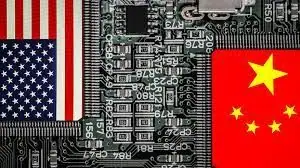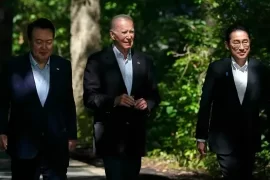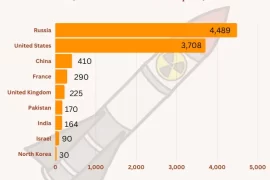The US-China relationship has been at the forefront of international relations in recent years, and the US’ competition policy with China is centered around decoupling. This policy was initiated by the Donald Trump administration and has been broadened by the Joe Biden administration. The decoupling strategy under the Biden administration is supposed to be “small yards with high fences,” meaning that only a limited number of technologies need to be safeguarded, but with much more intensity.
The US’ Decoupling Policy
To decrease its reliance on China, the United States has been attempting to decouple the American economy from China’s. Certain American politicians argue that this entails increasing tariffs on Chinese products, limiting exports to China, and scrutinizing investments from China. They claim that such measures are necessary to safeguard US intellectual property rights and to bring employment opportunities back to the country.
The US’ decoupling policy has affected the US business community operating in China. This sends a clear message that doing business with and in China is not welcome in Washington, though many US businesses are still thriving and making profits in China.
The Entity List, which keeps expanding, is one of the most notable measures taken by the US Commerce Department in this regard.
The Impact of Decoupling
The anti-liberal political climate in Washington has spilled over into the business world and is creating a challenge that will continue to haunt the business world for quite some time.
In reality, disengagement would affect consumers and businesses in both the United States and China. The economies of the two nations are closely intertwined, with China being a significant source of consumer products, such as electronics and clothing. Decoupling will force American consumers to opt for pricier substitutes, while US firms would have to relinquish business prospects in China.
Moreover, breaking away from China would necessitate a considerable overhaul of global supply chains since numerous goods sold in the United States are manufactured using components obtained from China. Such a task would be both time-consuming and costly.
Some US companies, such as Dell and Apple, have already taken steps to decouple from China. This is a big loss to China’s economy, as the country’s development over the past four decades can be partly attributed to its successful participation in the global value chain and industry chains, foreign direct investments in China, and contributions from multinationals, including many US companies.
The US Chamber of Commerce cautioned in a report released in 2021 that severing ties with China would result in economic distress. The report asserted that US firms would incur significant costs in terms of lost revenue opportunities and market share if they chose to forgo the Chinese market.
However, China-US trade data shows that despite a decrease in American exports to China and the trade war initiated by the US against China four years ago, trade between the world’s two largest economies remained robust.
According to data from China’s Monthly Customs Statistics, the trade in goods between China and the US reached a record high of $759.4 billion in 2022. Although Chinese goods exports to the US rose by $5.7 billion to $581.8 billion, American exports to China decreased by $1.9 billion to $177.6 billion.
China’s Response to decoupling
China strongly believes that decoupling has never been, and should never be, an option. Beijing is trying to come up with policies to counter such moves.
One such move is boosting confidence of foreign companies in China by portraying China a better place than North America and Europe in terms of growth potential, and communicating with foreign businesses in China to help solve their problems and help them grow.
Another move is being self-sufficient in core technologies such as semiconductor. Lawmakers and political advisers at 2023’s annual meetings of China’s Parliament and political advisory body have focused on China’s drive to attain world-class proficiency in chipmaking and withstand related US restrictions. There has been a marked increase in the number of National People’s Congress and national political adviser deputies who are senior executives and academicians in the semiconductor industry. They are urging for greater efforts to develop this strategically vital sector, including the creation of a chip law aimed at achieving breakthroughs.
It is important that competition between the US and China is fair, as coercion cannot win this race, and persuasion and cooperation need to be resorted to, opined China Daily, the English language daily owned by the Chinese Communist Party.








